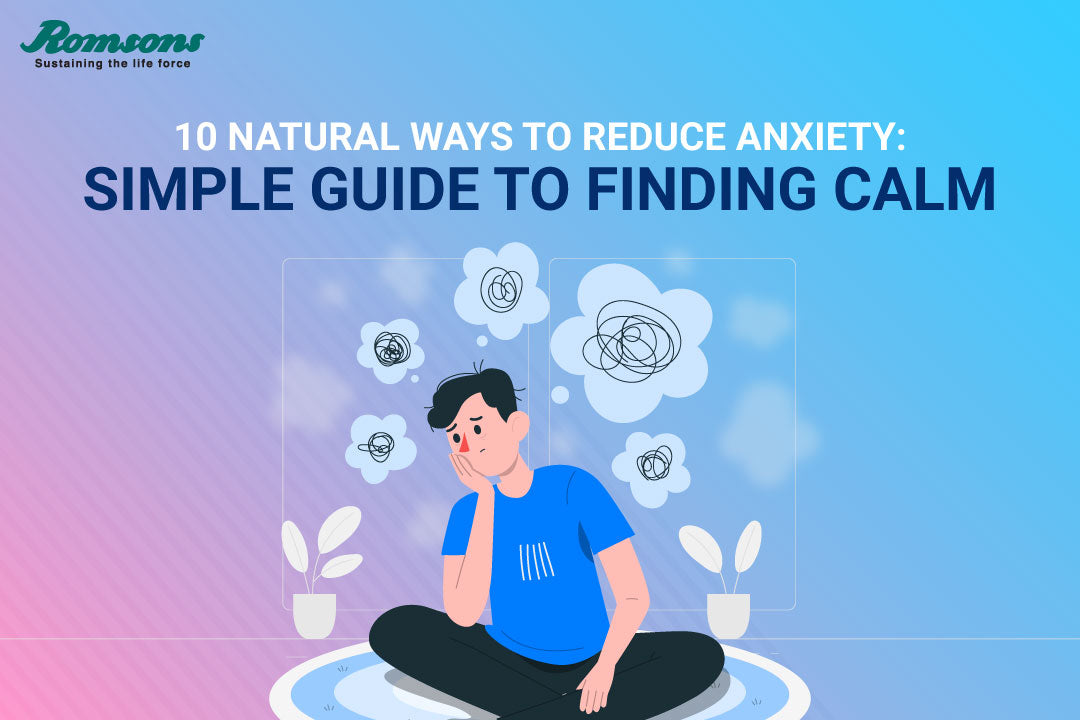10 Natural Ways To Reduce Anxiety: Simple Guide to Finding Calm

Anxiety is a normal human emotion that helps us stay alert and prepared for danger. However, when anxiety becomes excessive, chronic, and interferes with daily life, it can be debilitating. In an era where the buzz of daily life seems inescapable, anxiety has become a silent companion for many. From the pressures of work and society to the never-ending stream of news and social media, it's no wonder that anxiety disorders are among the most common mental health issues globally. Yet, amidst the clamour for quick fixes and pharmaceutical remedies, there's a growing recognition of the power of natural approaches to manage anxiety. Explore the 10 natural ways to reduce anxiety, and it will help you live a better life.
- Mindfulness Meditation: At the heart of mindfulness meditation is the practice of being present and fully engaged with whatever we're doing at the moment. Numerous studies have shown that regular mindfulness practice can significantly reduce symptoms of anxiety and stress. By focusing on the breath and observing thoughts without judgement, individuals can cultivate a state of calm and clarity, providing a refuge from the turmoil of anxious thoughts.
- Physical Exercise: The link between physical activity and reduced anxiety is well documented. Exercise is a vital tool for combating anxiety. Engaging in regular physical activity helps reduce stress hormones, improves mood, and boosts overall energy levels. First things first, aim for at least 30 minutes of moderate-intensity exercise most days of the week. Activities like brisk walking, running, swimming, cycling, or dancing are all excellent choices.
- Adequate Sleep: Sleep and anxiety have a bidirectional relationship; poor sleep can exacerbate anxiety, while anxiety can make it harder to fall asleep. Prioritising good sleep hygiene—maintaining a consistent sleep schedule, creating a restful environment, and avoiding caffeine and screens before bedtime—can improve sleep quality and by extension, reduce anxiety.
- Healthy Diet: What we eat affects how we feel. Diets rich in vegetables, fruits, lean proteins, and whole grains have been linked to lower levels of anxiety. Certain nutrients, like Omega-3 fatty acids, magnesium, and Vitamin B, play a crucial role in regulating mood and reducing anxiety. Conversely, high consumption of processed foods, sugary snacks, and caffeine can exacerbate anxiety symptoms.
- Deep Breathing Techniques: Rapid, shallow breathing is a common symptom of anxiety. Deep breathing exercises, however, can activate the relaxation response in your body, slowing your heart rate and calming your nervous system. Try simple techniques like diaphragmatic breathing, where you breathe deeply from your belly, expanding your abdomen with each inhale and contracting it with each exhale.
- Connect with Nature: Spending time in nature has profound effects on our mental health. Natural settings can lower stress levels, improve mood, and reduce feelings of anxiety. Whether it’s a walk in the park, gardening, or simply sitting under a tree, the connection with nature acts as a natural antidote to the hustle and bustle of modern life.
- Limiting Stimulants: Caffeine and alcohol are two legal stimulants that can significantly impact anxiety levels. While a moderate amount of caffeine might be necessary for some, it can cause nervousness and exacerbate anxiety symptoms in others. Similarly, alcohol might seem like a temporary escape, but it can lead to increased anxiety as its effects wear off. Monitoring and possibly reducing the intake of these substances can help manage anxiety levels.
- Aromatherapy: The calming power of essential oils, such as lavender, chamomile, and sandalwood, can be leveraged through aromatherapy. These scents can stimulate areas of the brain responsible for emotions, bringing about relaxation and reducing anxiety. A few drops in a diffuser or on a pillow can pave the way for a more serene mindset.
- Journaling: Writing down thoughts and feelings can be a therapeutic way to deal with anxiety. Journaling helps in organising thoughts, providing clarity, and releasing pent-up emotions. It can also help in identifying triggers and patterns in anxiety, offering insights into managing it better.
- Social Support: Finally, never underestimate the power of connection. Social support from friends, family, or support groups can help provide comfort, improve mood, and reduce anxiety. Sharing your experiences with others who understand and can empathise, can make the journey less isolating and more manageable.
Implementing These Strategies
Integrating these natural anxiety-reduction strategies into your daily life requires patience and persistence. It’s about finding the right balance and combination that works for you, as individual responses can vary significantly. Remember, these methods are meant to complement existing treatments and should not replace professional medical advice or therapy if needed.
Seeking Professional Help
While natural remedies for anxiety can be effective, they are not panaceas. If you find your anxiety to be overwhelming or debilitating, it’s crucial to seek professional help. Mental health professionals can provide personalised advice and treatment options, including therapy and medication, if necessary.
While these natural approaches can significantly reduce anxiety, they are not a substitute for professional medical advice or treatment. They can, however, complement existing treatments or serve as initial steps towards managing mild anxiety. It's also important to remember that what works is highly individual. It may take some experimentation to find the combination of strategies that might work best for you.
In our relentless pursuit of a balanced life, integrating these natural methods can serve as a beacon of hope and a testament to the resilience of the human spirit. By adopting a holistic approach to our well-being, we not only confront anxiety but also embrace a lifestyle that fosters peace, joy, and resilience in the face of life's inevitable stresses.

